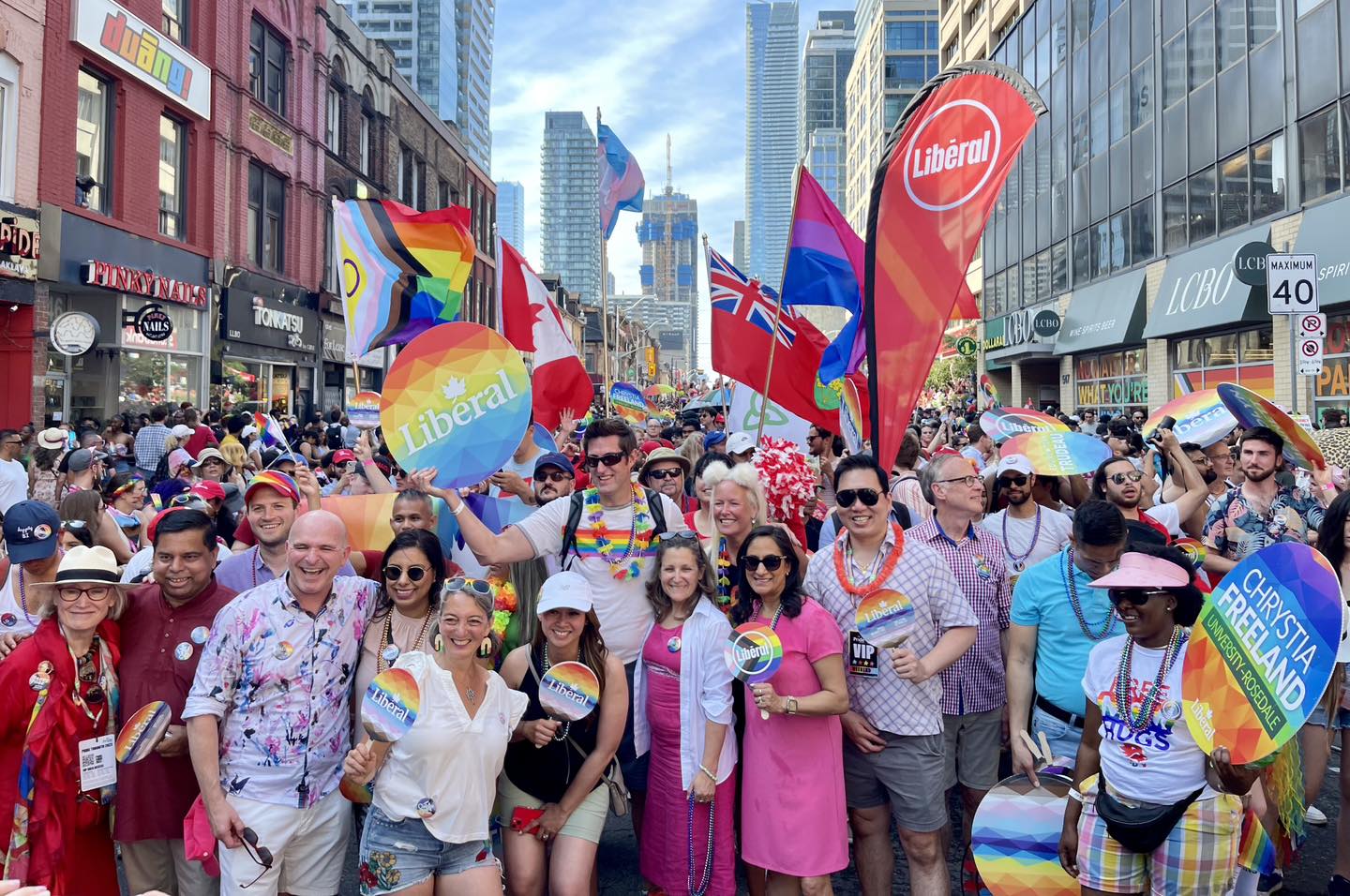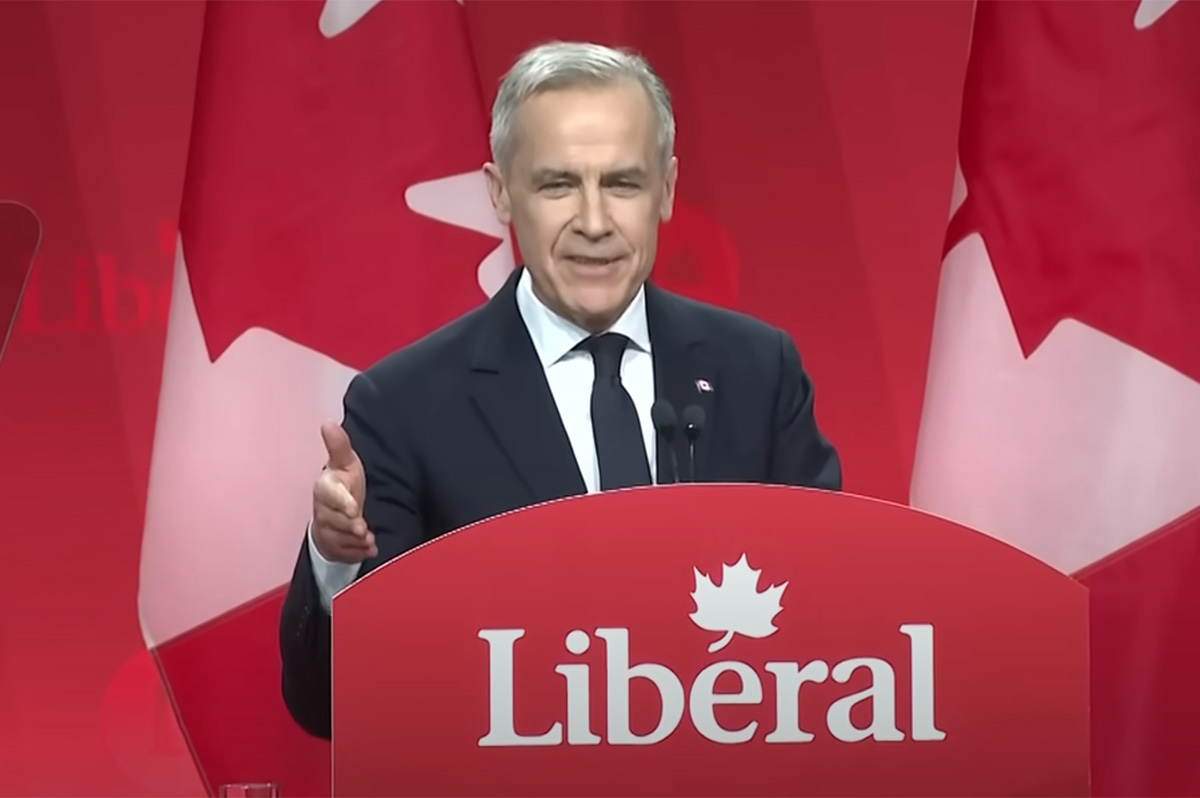Canada
Canada warns LGBTQ citizens about traveling to US
Advisory notes states have implemented anti-LGBTQ laws

Speaking with reporters Tuesday, Deputy Canadian Prime Minister Chrystia Freeland said that Global Affairs Canada has updated its travel advisory for the U.S. for LGBTQ Canadians.
The new advisory reads “some states have enacted laws and policies that may affect 2SLGBTQI+ persons. Check relevant state and local laws,” and directs people to a web page that CBC reported provides broad information on how members of the community could be targeted while travelling to foreign countries.
That advice tells travelers to beware of laws that criminalize same-sex activities and relationships, or target people based on their sexual orientation or gender identity.
That advice also warns travelers that laws to curb vagrancy and public nuisance incidents could also be used to target them in an effort “to criminalize 2SLGBTQI+ people.”
During the press briefing Freeland said she supported the decision to update the travel advice but would not comment on whether U.S. President Joe Biden was informed before the update was made.
“Every Canadian government, very much including our government, needs to put at the center of everything we do the interests and the safety of every single Canadian, and of every single group of Canadians,” she said. “That’s what we’re doing now. That’s what we’re always going to do.”
Freeland also told reporters that as a former foreign affairs minister, she’s confident that travel advisories appearing on the Global Affairs Canada website are “done very professionally.”
“We have professionals in the government whose job is to look carefully around the world and to monitor whether there are particular dangers to particular groups of Canadians. That’s their job and it’s the right thing to do,” the deputy prime minister added.
In a media statement released by Global Affairs Canada, the department said:
“Since the beginning of 2023, certain states in the U.S. have passed laws banning drag shows and restricting the transgender community from access to gender affirming care and from participation in sporting events. The information is provided to enable travelers to make their own informed decisions regarding destinations. Outside Canada, laws and customs related to sexual orientation, gender identity, gender expression and sex characteristics can be very different from those in Canada.”
The American Civil Liberties Union is tracking 495 anti-LGBTQ bills in the U.S. for the 2023 legislative year in over half of the U.S., a majority that would impact LGBTQ Canadian travelers.
Accurate IDs
These bills attempt to limit the ability to update gender information on IDs and records, such as birth certificates and driver’s licenses. This puts transgender people at risk of losing jobs, facing harassment and other harms. Trans, intersex and nonbinary people need IDs that accurately reflect who they are to travel, apply for jobs, and enter public establishments without risk of harassment or harm.
Civil rights
These bills attempt to undermine and weaken nondiscrimination laws by allowing employers, businesses and even hospitals to turn away LGBTQ people or refuse them equal treatment.
Free speech and expression
Despite the safeguards of the First Amendment’s right to free expression, politicians are fighting to restrict how and when LGBTQ people can be themselves, limiting access to books about them and trying to ban or censor performances like drag shows.
Healthcare
These bills target access to medically-necessary health care, like Medicaid, for transgender people. Many of these bills ban affirming care for trans youth, and can create criminal penalties for providing this care. These bills exempt identical treatments offered to cisgender youth or are forced onto intersex youth. Other bills block funding to medical centers that offer gender-affirming care, or block insurance coverage of health care for transgender people.
Public accommodations
Public accommodations bills seek to prohibit transgender people from using facilities like public bathrooms and locker rooms. Everyone should have access to these spaces, no matter their gender identity or gender expression. If you can’t use the restroom, you can’t fully participate in work, school, and public life.
Schools and education
State lawmakers are trying to prevent trans students from participating in school activities like sports, force teachers to out students, and censor any in-school discussions of LGBTQ people and issues. Instead of limiting resources, education, and opportunities, our schools should protect and support all students to learn and thrive.
Other anti-LGBTQ bills
These bills don’t quite fit in any of the other categories, but nonetheless target the rights of LGBTQ people. Examples include bans on marriage and bills preempting local nondiscrimination protections.
Canada
Shooter who killed 7 people inside Canada school was transgender
Advocacy groups have condemned efforts to link trans people to mass shootings

Canadian authorities on Wednesday said the person who killed seven people and injured more than two dozen others at a school in Tumbler Ridge, British Columbia, the day before was transgender.
Dwayne McDonald, the deputy commissioner for the Royal Canadian Mounted Police in British Columbia, during a press conference said Jesse Van Rootselaar, 18, “was born as a biological male who approximately … six years ago began to transition as female and identified as female both socially and publicly.” McDonald added it is “too early to say whether” the shooter’s gender identity “has any correlation in this investigation.”
The shooter died by suicide, and authorities found her body inside the school.
“We have a history of police attendance at the family residence,” said McDonald. “Some of those calls were related to mental health issues.”
Egale Canada, the country’s LGBTQ and intersex rights group, on Wednesday said it is “heartbroken by the horrific shooting in Tumbler Ridge.”
“Our deepest condolences are with the victims, their families, and the entire community as they navigate unimaginable grief,” said the group in a statement. “We unequivocally condemn this act of violence. There is no place for violence in our schools or in our communities. At this profoundly difficult time, we hold the people of Tumbler Ridge in our thoughts and stand in solidarity with all those affected.”
Mass shootings are relatively rare in Canada, unlike in the U.S.
GLAAD notes statistics from the Gun Violence Archive that indicate trans people carried out less than 0.1 percent of the 5,748 mass shootings in the U.S. between Jan. 1, 2013, and Sept. 15, 2025. The Human Rights Campaign, the National LGBTQ Task Force, and other advocacy groups last August condemned efforts to scapegoat the community after a trans woman shot and killed two children and injured 17 others inside the Annunciation Catholic School in Minneapolis.
Canada
Montreal Pride parade organizers reverse ban on Jewish groups
Initial decision left Ga’ava, Center for Israel and Jewish Affairs ‘deeply shocked’

Organizers of Montreal’s Pride parade have reversed their decision to ban Jewish groups from participating in the annual event.
The Montreal Gazette reported Fierté Montréal on July 30 informed Ga’ava, a group that is affiliated with the Toronto-based Center for Israel and Jewish Affairs, it could not march in the Aug. 10 parade.
Ga’ava in a statement said it and the Center for Israel and Jewish Affairs “were deeply shocked to learn today from Montreal Pride that LGBTQ+ Jews and their allies will be excluded from the 2025 Pride Parade.” Fierté Montréal earlier in the day in its own statement condemned “the ongoing genocide in Gaza, expresses solidarity with the Palestinian people, and calls for the lives of 2SLGBTQIA+ individuals in Palestine, and everywhere in the world — to be respected and protected.”
“Fierté Montréal’s position on violence of any kind inflicted upon marginalized populations or communities — especially 2SLGBTQIA+ communities — has always been clear: we denounce all forms of violence, we amplify the voices of queer communities who, on our stages and in our spaces, express their support for oppressed peoples, particularly the Palestinian people, and their opposition to genocide,” said Fierté Montréal. “The work of Fierté Montréal is rooted in a long-standing movement to fight oppression, and we acknowledge the pain expressed by queer communities in Montréal since the beginning of the conflict in Gaza.”
“Accordingly, and in line with our zero-tolerance policy for hate speech and incitement to violence, and to ensure that the Fierté Montréal Festival remains a safe and celebratory space for everyone, the board of directors of Fierté Montréal has made the decision to deny participation in the Pride Parade to organizations spreading hateful discourse,” it added. “This measure is taken in the context of a complex geopolitical situation and stems from our commitment to preserving the emotional and physical safety of our communities.”
Five Canadian MPs are among those who sharply criticized Fierté Montréal’s decision.
Bernard Truong, the group’s former board chair, resigned on Monday. The Montreal Gazette on Tuesday spoke with his successor, Marlot Marleau, about the decision to reinvite Ga’ava and the Center for Israel and Jewish Affairs to participate in the parade.
“We realized the decision was seen as excluding the entire Jewish community. That was never the intent,” Marleau told the Montreal Gazette. “We’re sorry for making them feel unwelcome.”
“LGBTQ+ Jews are happy that Montreal Pride walked back its politically motivated decision to oust the Jewish community from the Pride Parade,” said Ga’ava President Carlos A. Godoy on Tuesday in a statement he sent to the Washington Blade. “Either you’re inclusive or you’re not. LGBTQ+ Jews have to bring their full authentic selves to the parade — we can’t ask Jews to separate their identities and attachments. LGBTQ+ Jews belong in Pride parades.”
Canada
Liberal Party wins Canadian election
Prime Minister Mark Carney railed against US tariffs, sovereignty threats

Canadian Prime Minister Mark Carney’s Liberal Party won the country’s federal election that took place on Monday.
The Canadian Broadcasting Corporation notes the Liberals won 169 seats in parliament, compared to the 144 the Conservative Party won. The Liberals need 172 seats for a parliamentary majority.
Liberal Bruce Fanjoy defeated Pierre Poilievre, an anti-LGBTQ MP from Ontario who is the Conservatives’ leader, by a 50.6-46.1 percent margin.
The Liberals last month elected Carney to succeed Justin Trudeau as the country’s prime minister. Monday’s election took place against the backdrop of growing tensions with the U.S. that stem from tariffs the Trump-Vance administration has imposed against Canada, and suggestions the country should become the 51st state.
“Our strength lies in our resolve to work together,” said Carney on Tuesday in a post to his X account. “United, we will build Canada strong.”
Thank you, Canada.
Our strength lies in our resolve to work together. United, we will build Canada strong. pic.twitter.com/uN6h4LUAEP
— Mark Carney (@MarkJCarney) April 29, 2025
Egale Canada, the country’s largest LGBTQ and intersex rights group, earlier this year announced it will not attend WorldPride and other events in the U.S. because of the Trump-Vance administration’s anti-transgender policies and “economic warfare and threats to our national sovereignty.”
“Democracy thrives when people engage, and our voices are used in a way where we can say we voted with pride,” said Egale Canada on Tuesday.
“As the new parliament takes shape, we recognize that the journey toward equity and inclusion — especially for 2SLGBTQI communities — extends far beyond election day,” added the group in its post-election statement. “The work of understanding, addressing, and acting on the issues faced by 2SLGBTQI people must be ongoing, collaborative, and grounded in human rights and lived experience.”
Egale Canada said it looks “forward to working with all members of parliament, both newly elected and returning, to help build a Canada where every person is treated with dignity, where diversity is celebrated, and where all are equal — and none are other.”
-

 Opinions5 days ago
Opinions5 days agoUnconventional love: Or, fuck it, let’s choose each other again
-

 National4 days ago
National4 days agoFour bisexual women on stereotypes, erasure, representation, and joy
-

 Theater4 days ago
Theater4 days agoMagic is happening for Round House’s out stage manager
-

 Baltimore2 days ago
Baltimore2 days ago‘Heated Rivalry’ fandom exposes LGBTQ divide in Baltimore



















